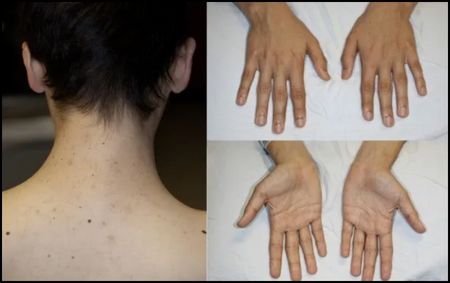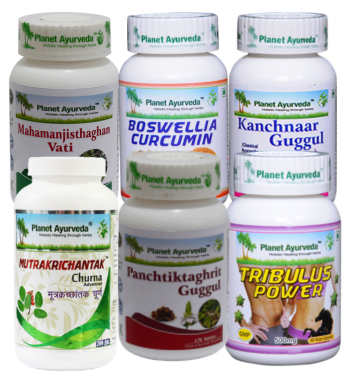Treatment Of Schmidt’s Syndrome in Ayurveda With Herbal Remedies
Abstract
Schmidt’s syndrome is also known as Autoimmune polyglandular syndrome type2. The clinical triad consists of autoimmune hypothyroidism, type 1 diabetes, and Addison’s disease. Autoimmune hypothyroidism is a condition where the body’s immune system antibodies attack the thyroid. Addison’s disease is a condition where adrenal glands can not produce enough aldosterone and cortisol hormones. Type 1 diabetes is a condition where the body’s immune system destroys the insulin hormone that is secreted by the pancreas. It mostly affects women in the age of 30-40 years. If left untreated it will lead to very serious complications.

Introduction
Schmidt’s syndrome is an autoimmune disorder that affects the endocrine gland of the body. It is a rare autosomal dominant disease. It is more common in females at the age of 30-40 years. It is associated with polygenic inheritance. The most common cause is genetics and is also affected by environmental factors but most of the time it is sporadic. It most commonly involves Type 1 diabetes, Autoimmune hypothyroidism, and Addison’s disease. The less commonly involved are Vitiligo, Pernicious anaemia, Alopecia, Hypergonadotropic hypogonadism, and atrophic gastritis. As Schmidt syndrome is a risk for ketoacidosis and hypoglycemia with neuroglycopenic symptoms such as Dizziness, weakness, tiredness, confusion, difficulty in concentration, drowsiness, and blurred vision are symptoms that commonly occur.
Causes
- Genetic
- Stress
- Lifestyle
- Environmental factors
- Familial factors
- Infection
- Dietary habits
Symptoms
Schmidt’s syndrome consists mix of symptoms described below-
1. Autoimmune Hypothyroidism
- Enlarged thyroid gland in the neck
- Irregular heartbeat
- Enlarged heart
- Poor heart function
- Dull facial expression
- Puffiness and swelling around the eyes
- Dropping of eyelids
- Increase in low-density lipoproteins
2. Addison Disease
- Bronze pigmentation of the skin
- Loss of appetite
- Weight loss
- Weakness
- Changes in the distribution of body hair
- GI disturbance
- Hypoglycemia
- Increased thirst
- Frequent urination
- Postural hypotension
- Fatigue
- Muscle weakness
- Lethargy
- Low mood
- Craving for salty food items
3. Type 1 diabetes
- Itching of skin
- Frequent urination (Polyuria)
- Weight loss
- Changes in the vision
- Excessive hunger (Polyphagia)
- Excessive thirst (Polydypsia)
Diagnosis
Diagnosis is done on the basis of clinical features and the identification of autoantibodies.
- MRI (Magnetic resonance imaging)
- CT (Computerised tomography)
- USG
- Urine test
- Blood test
- Biopsy
Treatment
Schmidt syndrome treatment depends on the hormones involved.
- Hormonal replacement therapy
- Glucocorticoids
- Cyclosporin A
- Thyroid-stimulating hormone
Ayurvedic Aspect Of Schmidt’s Syndrome
In Ayurveda, Schmidt’s syndrome is correlated with the ojas vikriti which is explained under the Vyadhikshamatva. The ojas vikriti is mainly caused due to improper diet and lifestyle which decrease the quality of life. Oja is the strength of our body and kapha dosha is mainly responsible for this. It maintains the physical and mental status of the body.
In सु.सू. १५
“समदोषः समाग्नि समधातु मलः क्रियाः ।
प्रसन्न् आत्मेन्द्रिय मनः स्वस्थ्यइतिअभिधीयते ॥’’
Balance in dosha, agni (digestive fire), and excretion of malas (waste) then the aatma, indriya, and mana will be happy and the person will be healthy. As a person is healthy the oja is in a normal state and promotes healthy functioning of the body.
Types Of Oja With its Qualities
The oja is described in two types Apara oja is considered an essential amino acid and Para oja is considered in non essential amino acid. As an imbalance in amino acid, there is an imbalance in oja.
The oja qualities are white in color, free flow, soft, clear, and cold in potency.
Causes
- Deposition of ama (waste) in the body
- Low digestive fire
- Imbalance in dosha
- Improper excretion of malas (waste)
- Improper diet and activities
Symptoms
The ojas vikriti symptoms are described below-
- Fatigue
- Lethargy
- Weakness in muscles
- Change in blood pressure
- Disturbed sleep
- Difficulty in concentration
- Inflammation of joints
- Anxiety
- Fever
- Change in body weight
Ayurvedic Management
It is mainly due to the deposition of toxins in the body so firstly remove the toxin from the body, as toxins are removed from the body it increases the digestive fire of the body that helps in improving the metabolism of the body, as metabolism improves it helps to correct the imbalanced ojas dhatu in the body and improve the immune system of the body.
- Avoid the cause (Nidana parivarjana)
- Removal of aam from the body – Aam plays an important role in the body as aam is present in the body it produces an imbalance in the body. Some herbs are beneficial in the removal of toxins from the body such as Rock salt (saindhav Lavan), Maricha (Piper nigrum), and pippali (Piper longum).
- Increase in the metabolism of the body – As the body removes aam from the body the digestive fire of the body increases and improves the metabolism of the body. Some herbs are described below to increase metabolism in the body such as Guduchi (Tinospora cordifolia), Neem (Azadirachta indica), and Guggulu (Commiphora wightii).
- Increase in the ojas dhatu – As ojas play an important role in balancing the immune system of the body. To correct the ojas some of the herbs are described below such as Amalaki (Emblica officinalis), Yasthimadhu (Glycyrrhiza glabra), and Pippali (Piper longum).
- For improvement in the immune system – It is important that the immune system works properly so quality of life remains sustainable. Some of the herbs described in Ayurveda, help to calm the mind, improve the immune system of the body and correct the functioning of the body. The herbs are Ela (Elettaria cardamomum), Amalaki (Eblica officinalis), and Yasthimadu (Glycyrrhiza glabra).
- Use of Rasayan Dravyas – Amalaki (Eblica officinalis), Pippali (Piper longum), Guduchi (Tinospora cordifolia), Tulsi (Ocimum sanctum), Punarnava (Boerhavia diffusa).
Herbal Remedies For Schmidt’s Syndrome By Planet Ayurveda
Planet Ayurveda provides an herbal remedy and it is GMP-certified. All the products are made under the guidance of M.D. Ayurveda experts with a pure vegetarian formula. The herbs are free from any type of adulterants, fillers, yeast, chemicals, binders, and preservatives. Products are made up of 100% natural ingredients and without any side effects to the body. Formulation offered by Planet Ayurveda for Schmidt’s syndrome-
Product Description


1. Kanchnaar Guggul
The Kanchnaar guggul tablets are made of an extract of different herbs that contain Tejapatra (Cinnamomum tamala), Varuna Bark (Crataeva religiosa), Ginger (Zingiber officinale), Black pepper (Piper nigrum), Pippali (Piper longum), Kachnar bark (Bauhinia variegata), and many other herbs. It contains triphala (Amla, haritaki, and Bibhataki) which helps to detoxify the body as it removes aam from the body. It also contains Trikatu (Ginger, Pippali, and Maricha) which help in increasing the digestive fire and improving the metabolism of the body.
Dosage – 2 tablets twice daily
2. Boswellia Curcumin
Boswellia curcumin tablets are made up of a combination of Curcumin (Curcuma longa) and Shallaki (Boswellia serrata). It contains anti-inflammatory properties which help to reduce the pain and swelling around the joints. Curcumin regulates the inflammatory cytokines which helps in preventing autoimmune disease. Shallaki helps to promote natural healing in the body. It is a natural immunity builder herb that helps to improve immunity and the functioning of the body.
Dosage – 1 Capsule twice daily, after meals with plain water
3. Navkarshik Churna
The churna contains the old herbs which are described in the ancient text of Ayurveda. It contains a combination of Neem (Azadirachta indica), Vacha (Acorus calamus), Manjistha (Rubia cordifolia), and many other herbs. Triphala (Amla, Haritaki, and Bhibitaki) contains vitamin C and is rich in antioxidants which help in making the skin soft, smooth, and healthier. Vacha contains immunomodulatory properties that help improve the immune system. Katuki extract helps in lowering the blood sugar level in blood so helps in curing diabetes. Daruhaldi helps boost immunity, regulate diabetes, promote digestive fire, and help in digestion.
Dosage- 1 teaspoon twice daily with warm water
4. Panchtiktaghrit Guggul
The tablets contain Vasa (Adhatoda vasica), Guggul (Commiphora mukul), Patola patra (Trichosanthes dioica), Kantkari (Solanum xanthocarpum), cow ghee and other herbs. Giloy improves the digestive system and metabolism of the body and reduces the sugar level in the blood. Patola patra reduces muscle pain and is rich in vitamin C which helps with skin dryness. Kantkari pacifies the vata dosha in the thyroid gland and increases the production of thyroid hormone.
Dosage- 2 tablets thrice daily with lukewarm water
5. Mahamanjisthaghan Vati
The tablets are made up of standardised extraction of Mahamanjistha Kwath Ghan (Rubia cordifolia). It relieves the itching of the skin and pigmentation of the skin. It contains antibacterial and antioxidant properties which helps to cure skin infection and complexion. It increases the production of white blood cells which helps to fight against the microorganism and enhance immunity. It raises the level of Dopamine neurotransmitter which calm the mind and relieve stress and alleviates mood.
Dosage- 2 tablets twice daily
6. Tribulus Powder
The capsules are made up of Gokshura (Tribulus terrestris). It contains analgesic and anti-inflammatory properties which help in reducing pain and inflammation of joints. It contains healing properties that help with skin irritation and itching of skin. It improves the cognitive function of the brain and reduces stress. It contains a diuretic property which helps in removing the toxins from the body and maintaining the blood sugar level.
Dosage- 1 capsule twice daily, with plain water, after meals
Conclusion
Due to abnormality in the function of the endocrine gland, Schmidt’s disease will occur. In this article we read about as it is due to an imbalance in oja it leads to imbalance functioning of the body. Oja is important to maintain the normal functioning of the body. Our immunity helps to fight against harmful microorganisms that are present in our body and prevent the disease from occurring. In Ayurveda, as the dosha is maintained in a normal state and proper secretion of malas (waste) is there it helps to maintain the proper oja in the body. The immunomodulatory herbs that help to cure autoimmune diseases such as Amalaki (Eblica officinalis), Pippali (Piper longum), Guduchi (Tinospora cordifolia), Tulsi (Ocimum sanctum), Punarnava (Boerhavia diffusa).
Planet Ayurveda provides an herbal remedy to cure the disease without any side effects on the body. The product includes the following Kanchnaar Guggul, Boswellia curcumin, Navkarshik churna, Panchtiktaghrit Guggul, Mahamanjisthaghan vati, and Tribulus powder.
Dr. Vikram Chauhan
Latest posts by Dr. Vikram Chauhan (see all)
- Ayurvedic Alternatives to Zolpidem, Benzodiazepines & Suvorexant for Insomnia - December 13, 2025
- Clinically Tested Ayurvedic Products for Fatty Liver: Causes, Symptoms & Ayurvedic Treatment - December 12, 2025
- How to Manage Sarcoidosis with Ayurvedic Treatment - December 10, 2025
- Ulcerative Colitis: Causes, Symptoms, Types and Ayurvedic Management - December 4, 2025
- How to Manage Chronic Kidney Disease with Ayurveda - December 1, 2025




